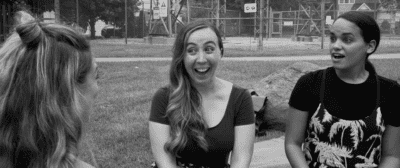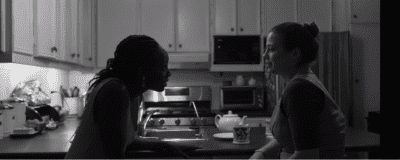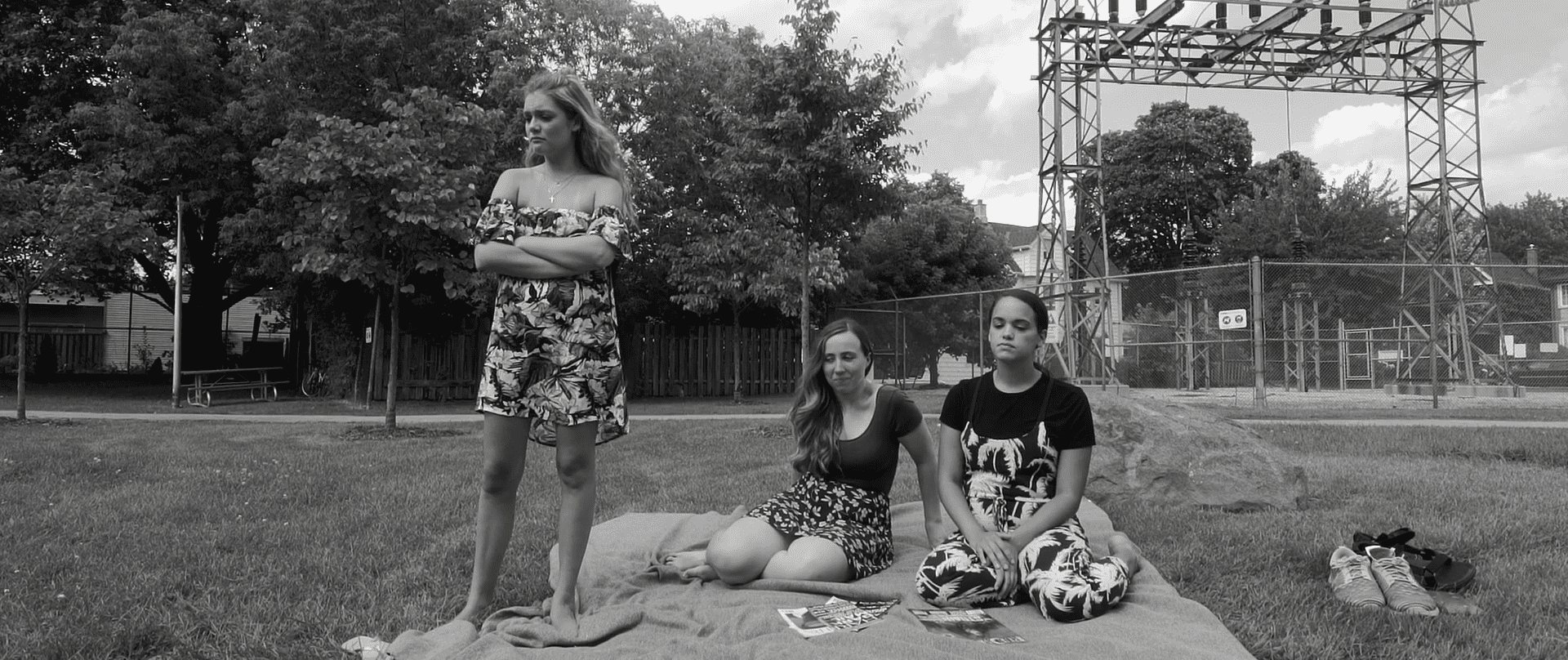The people behind Just Cuddle and Saving Hope released a new web series this week: Friendship. Inspired by true stories, the series offers six different vignettes of friendships–some funny, others heart-wrenching. Friendship explores the warts and all aspects of friendship, without Instagram filters or aspirational messaging.
We talked to the writers of two separate episodes in the series. In “Surprise,” a young woman spoils the news of another friend’s pregnancy. In “Porcelain Club,” two friends struggle to traverse a rift in the shadow of an eating disorder.

“Surprise,” written by Winter Tekenos Levy
SDTC: Where’d the inspiration for “Surprise” come from?
WTK: It’s loosely based off a real experience, where a friend let it slip that our other friend was pregnant, and we had to go into full cover-up mode. I find the great lengths we go to [in order to] protect our big announcements is really funny and silly, but ultimately, it’s kind of lovely.
Listening to this, I felt like I was eavesdropping on actual friends. What is your approach to writing dialogue?
Most of my dialogue tends to be real conversations but with some pruning. It helps if I can see myself in one character, and then I can bounce dialogue around. Also, reading the script out loud helps to crystallize the voices.
What are the advantages of writing for a short webisode format? What are the challenges?
The advantage is that you’re telling a single story, which is simple enough, and you don’t have to worry so much about plot points or structure. But the challenge is that the idea has to be more clear and succinct than a full-length episode because you don’t have as much time to let it breathe.
“Surprise” really hits on those intertwining (and sometimes conflicting) personality dynamics that close friends experience. What was your intention for this script?
I think to highlight exactly that: often our closest groups of friends have conflicting personalities and POVs, but I love the way a group (in this case, girlfriends) can manage those temperaments and problem-solve to make sure everyone feels appreciated, especially when it’s concerning something as trivial as a baby announcement.
Do you feel that female friendships are accurately represented in mainstream media?
I think female friendships are still heavily portrayed through the male gaze, which shows us as one-note, unconditionally sweet and affectionate. Either that, or the women are “catty” and hate each other as if there’s no in between. I’d like to see more of the in between.
What was the best part of working on this series?
Watching the actors read through and find their chemistry. It’s amazing to see something you’ve written shift to a better place when talented actors give it their own spin.

“Porcelain Club,” written by Emma Mackenzie Hillier
SDTC: Where did the inspiration to write “Porcelain Club” come from?
EMH: Tom Pepper (my friend and the director of the short) mentioned the Friendship project and suggested I submit a script. The parameters of the submission were around the theme of friendship. I looked to my past friendships for an idea and the memory of an encounter, much along the lines in the film, surfaced. The memory and experience I had could be called the direct inspiration.
The indirect inspiration, and what informs the story’s action, has to do with complicated power dynamics in friendships. In the case of “Porcelain Club,” [it was] the dynamic of a “healthier” friend inadvertently playing therapist or counsellor to a struggling loved one when they don’t have the experience to do so. I’ve played both the therapist and the struggler in my friendships, and it’s often been detrimental to both parties. I’m lucky that many of my friends have persevered with me as we figured out those “power struggles,” for lack of a better term. I wanted to capture that dynamic.
Has bulimia affected you or a loved one?
Bulimia has affected my life. I was exhibiting symptoms in my early twenties and luckily received help quickly–the University of Windsor, where I was at school, thankfully had a program set up with a local counselling service specializing in eating disorders. I was extremely lucky. I caught it very early at about six months of severe symptoms of bulimia. I didn’t catch the over-exercising for a little while longer.
There were a number of girls in my program at school that had eating disorders; I was just one of many. In conversation with friends now, ten years later, I’m discovering that so many of my friends (of any gender) have had eating disorders and/or are still struggling with them.
Why did you want to bring that particular issue into this series?
I thought the context for the relationship’s distress being based in an eating disorder would allow for the story to include the subject without it dominating. I don’t want to “teach” the audience about eating disorders, but it’s an explosively personal topic that requires great strength to talk about.
Eating disorders are a highly isolating mental illness. When I was ill, I thought that my behaviour was healthy but no one else would understand, so I couldn’t tell anyone. The betrayal in the film is that much deeper because of the trust it takes to confide in a friend. It’s not so much that I wanted to include eating disorders in the series as I wanted a rich journey for my characters to travel.
What do you like about writing for a short webisode format?
The challenge and what I enjoy about writing a short webisode are the same thing: it’s short. You don’t have time to build up to the action; you have to start with the tension and struggle of the characters immediately. The challenge is to be concise and create an impactful story. Unsurprisingly, those two ideas go hand-in-hand in some of the best writing and films. I like the challenge of cutting back the text and details, trusting the actors, director and crew to add the details you have in your head.
Did the script for this short evolve over time?
The script certainly evolved but mostly in details of setting or tweaks. The basic story arc was there from the beginning. Thanks to input [from] my smart and talented director, Tom, and from the Friendship power duo of Michael Gray Kimber and Elias Campbell, the little tweaks made me aware of some of the eccentricities of writing for the screen instead of the stage. Honestly, a first-time screenwriter couldn’t hope for a better group of people to provide feedback.
This episode was very uncomfortable to watch as it grapples with that uncertainty that comes with telling your friends what they don’t want to hear. What were you hoping came across in the script when you wrote it?
I’m sorry to hear it was very uncomfortable to watch! But I’m glad that it evoked that squirmy kind of “oh geez this really sucks,” because that is what I was hoping to capture. I was hoping to create a scenario where the love one feels for another means potentially hurting them–if not pushing them away completely–because what they need to hear is more important than your friendship. And, to be fair, this is all subjective. What I think of as helping another may just be seen as cruelty by others. But I firmly believe that sunshine is the best disinfectant, no matter how much it sucks.



 Follow Us On Instagram
Follow Us On Instagram
